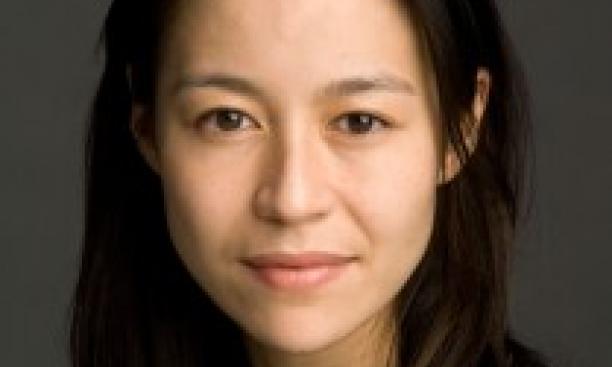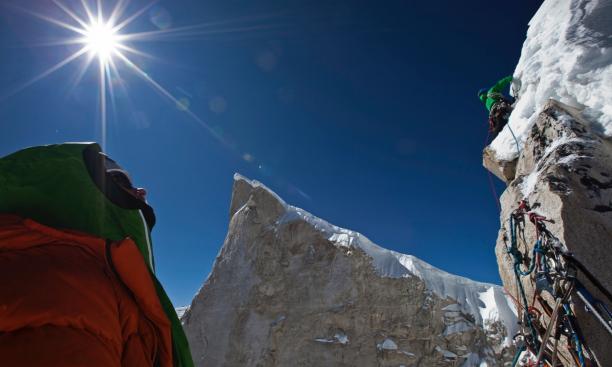

Meru, a Sundance Audience Award-winning white-knuckler of a documentary, follows three elite mountain climbers on their quest to conquer the 21,000-foot summit of Mount Meru, the most technically difficult peak in the Himalayas. It’s a death-defying expedition into sub-zero temperatures that involves extraordinary risks.
But the mission that climbers Conrad Anker, Renan Ozturk, and Jimmy Chin share is not only physically grueling; it’s emotional. Meru tests their friendship, and their relationships with their families back home.
No one knows this better than Elizabeth Chai Vasarhelyi ’00, who co-directed and co-produced the film with Chin. The directors fell in love through the making of Meru, and they married in 2013. Now, they split their time between the Upper East Side of New York City and the big blue skies of Jackson Hole, Wyo.
“I’m not a climber, so I was always more interested in the human relationships in the film,” Vasarhelyi said from New York as the couple’s toddler, Marina, gurgled patiently after waking up from her afternoon nap. (She’s used to Mommy doing interviews, Vasarhelyi laughed.)
Vasarhelyi and Chin met at a conference in 2012. Chin, a professional alpinist and cinematographer, shot the film with Ozturk on their two Meru expeditions in 2008 and 2011.

“I feel that a good story is a good story. Jimmy’s story had all of the ingredients to make a great film. He just needed an experienced filmmaker to help him,” Vasarhelyi said.
“For me, it was important to truly understand the real stakes and risks that they have in making these decisions. And that has to do with their families.”
Vasarhelyi has taken this approach to understanding risk, passion, and conflict in her other films, each of which focus on how the West views Islam. Touba (2013), documents the annual pilgrimage of Sufi Muslims in West Africa; it won South By Southwest’s Special Jury Prize for Cinematography. Youssou N’Dour: I Bring What I Love (2009), which follows the rise of a Senegalese pop star, premiered at the Telluride and Toronto Film Festivals. Vasarhelyi’s most recent film is Incorruptible (2015), which covers the violent 2011 presidential elections in Senegal.
“Yes, I definitely took risks,” Vasarhelyi said. “I was willing to take certain risks as a journalist. If you believe in the subject matter, if you think it’s worthwhile, if you think you have a way to bring this story to light — it’s worth it.”
Vasarhelyi’s first film, A Normal Life (2003), drew from her senior thesis work on postwar Kosovo. As a comparative literature major at Princeton, she recalls feeling “confounded” by the conflict in Kosovo.
After interning at ABC News, Vasarhelyi felt compelled to go abroad to study the conflict. Remarkably, she and co-director Hugo Berkeley ’99 did just that. “It was naïve,” she said. “It was a very idealistic premise: to figure out what was going on for ourselves, and going. It was this passion that drove me to go.”
“We were terrified,” she said. “But it seemed like — safe enough.”
A Normal Life premiered at the 2003 Tribeca Film Festival and won Best Documentary.
“It was a very special experience — it really launched my career,” she said. “But you don’t have to make your first film in college. I think people should take advantage of their liberal arts education. Princeton is a very special place. You have the rest of your life to make your films.”
Meru opened last weekend at the Princeton Garden Theatre. Now on 150 screens in the United States and Canada, Meru is distributed by Music Box Films, which is owned by William Schopf ’70. For more info, visit www.merufilm.com and www.littlemonsterfilms.com.
